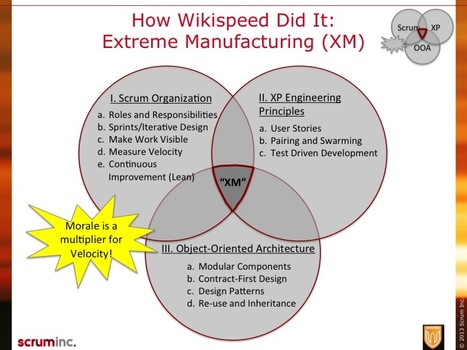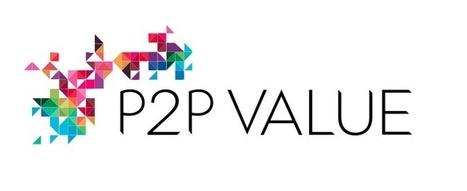 Your new post is loading...
[This is the twelfth installment in my serialization of my book-in-progress, tentatively titled Desktop Regulatory State] , and the second of two installments on Chapter Seven. Because I have split some chapters into multiple new ones since the previously posted excerpts, there is a loss of continuity in numbering. The current Table of Contents with active links can be found here.]
Dmytri Kleiner has written a Marxist critique of both the limitations of the General Public Licene and the Creative Commons license (forMute Magazine), which ends with a proposal for a new type of Copyfarleft license which would disallow commercial usage, but only by private firms.
If there was ever a need for political representation or a paternalistic and opaque authority it has been removed by technology. Every political system we have tried has proven incapable of protecting human rights and dignity. Every political system we have tried has devolved into oligarchy. To effect the change we require immediately, to give individuals control and responsibility, to bring regional systems under regional governance, allow global collaboration and protect the heritage of future generations, we need a new political model.”
“When it comes to the “Homebrew” dream of an actual desktop factory, the most promising current development is the Fab Lab. The concept started with MIT’s Center for Bits and Atoms. The original version of the Fab Lab included CNC laser cutters and milling machines, and a 3-D printer, for a total cost of around $50,000.
we build innovative financial systems
We published a number of references in order to arrive at a more precise definition of open knowledge and its various aspects, see the entry here, inspired by the work of the Open Knowledge Foundation.
That’s as much excuse as there is for this week’s detour. A few weeks ago, the P2P Foundation website hosted a piece by Kevin Carson titledWhen Ephemeralization is Hard to Tell from Catabolic Collapse. Carson’s piece got some attention recently in the peak oil blogosphere, not to mention some pointed and by no means unjustified criticism. It seems to me, though, that there’s a valid point tucked away in Carson’s essay; he’s got it by the wrong end, and it doesn’t imply what he thinks it does, but the point is nonetheless there, and important.
Packed into a small conference room, this rag-tag band of software developers has an outsized digital pedigree, and they have a mission to match. They hope to jailbreak the internet. They call it the Indie Web movement, an effort to create a web that’s not so dependent on tech giants like Facebook, Twitter, and, yes, Google — a web that belongs not to one individual or one company, but to everyone. “I don’t trust myself,” says Fitzpatrick. “And I don’t trust companies.” The movement grew out of an egalitarian online project launched by Fitzpatrick, before he made the move to Google. And over the past few years, it has roped in about 100 other coders from around the world. On any given day, you’ll find about 30 or 40 of them on an IRC chat channel, and each summer, they come together in the flesh for this two-day mini-conference, known as IndieWebCamp.
The first thing to say is that the concept of ‘Good Living’ or Sumak Kawsay (in the Quechua language) arises out of the political struggles of the people. This is important to emphasise because generally proposals come from intellectuals, academics, the UN Economic Commission for Latin America and the Caribbean for example, but this concept comes from people’s traditions and is now enshrined in the Constitution of the Republic of Ecuador. Clearly it represents a fusion between a Western outlook, from an Aristotelian perspective, which merges with an indigenous perspective, the Sumak Kawsay (‘Good Living’). Ecuador is not Bolivia. Ecuador does not have such a large indigenous population, it contains a larger mestizo population, but it coexists within a plurinational state, which contains about 14 indigenous communities. We believe that the world does not need development alternatives but alternatives to development. It is necessary to create a completely different world.
Jeff Sutherland explains the methodological ideas behind the Xtreme Manufacturing process used to design the WikiSpeed cars:
“Restart was started by Janet Gunter and Ugo Vallauri in 2012. Their mission is to help grow a more widespread culture of repair. They organise Restart Parties in London twice a month, where people can bring along their broken gadgets and work with the Restart repairers (or Restarters) to try and find a fix. These events encourage more people to think about repair as a possible option for their gadgets, to become better skilled and to also save repairable items from ended up as landfill.
The general internet infrastructure that we love so much because it enables peer to peer dynamics, is also itself part of the problem in causing global warming. How can we preserve this important infrastructure under the pressure of the environmental cost?
|
t’s a familiar pattern. First there’s an economic crisis. Then comes an enormous restructuring of capital — and with it a restructuring of labor — throwing past certainties into doubt. Old industries, companies, and occupations disappear and new ones emerge, enabled by new technologies. As people struggle to find a way to describe the seismic upheavals in the economic and social landscape, a linguistic mist arises, muddling the features of this new landscape, blurring attempts to analyze and map it.
We recently caught up with Jarno Koponen, co-founder of Random. We were keen to learn more about his background, his perspective on predictive content discovery and what he is working on now at Random...
‘Co-operative accumulation to what end’ is a strategic issue, John. So too, is the invisibility of the ecological in this discourse and the question of how we invent language and practices that explicitly help us to live within limits. Practically none of the comments you so far have received touch on the latter point. Here are some further reflections, grist for the commonweal so to speak. (Please note that I have not had the benefit of reading Robin’s paper. I am only picking up on the thread.)
In his talk last July at Open Government Melbourne Meetup, Donnie Maclurcan explains why Not for profits will take over For profits and change the game. To relate to Michel’s notion of ‘For benefit’, and the recent post on cooperative accumulation. These are the highlights of the talk:
The original technological revolution of the late Middle Ages, the eotechnic, was associated with the skilled craftsmen of the free towns, and eventually incorporated the fruits of investigation by the early scientists. It began with agricultural innovations like the horse collar, horseshoe and crop rotation. It achieved great advances in the use of wood and glass, masonry, and paper (the latter including the printing press). The agricultural advances of the early second millennium were further built on by the innovations of market gardeners in the sixteenth and seventeenth centuries—like, for example, raised bed horticulture, composting and intensive soil development, and the hotbeds and greenhouses made possible by advances in cheap production of glass.
Commons-based peer production (CBPP) is a new and increasingly significant model of social innovation based on collaborative production by citizens through the Internet. This project will foster the CBPP phenomenon by providing a techno-social software platform specifically designed to facilitate the creation of resilient and sustainable CBPP communities. The design of the P2Pvalue platform will be empirically and experimentally grounded. Through a triangulation of qualitative and quantitative methods, we will elaborate guidelines for the institutional and technical features that favour value creation in CBPP.
Arduino has announced that it is shipping a new product, an open source robotic platform, for prices starting from 189€.
In the last years we have witnessed an incredible proliferation of shared machine shops in a confusing number of genres: hackerspaces, makerspaces, Fab Labs and their more commercial counterparts such as TechShops, co-working spaces, accelerators and incubators.
As the crisis progresses, and with it the gradually increasing underemployment and unemployment and the partial shift of value production from wage labor to the informal sector, we can probably expect to see several converging trends: a long-term decoupling of health care and the social safety net from both state-based and employer-based provision of benefits; shifts toward shorter working hours and job-sharing; and the growth of all sorts of income-pooling and cost-spreading mechanisms in the informal economy….
This is not a new article, but a transcript of a marvellous talk by Graham Seaman in 2002 (at the Oekonux conference). I have added it to our selection of key peer to peer essays, which I believe everyone should read to understand the various key aspects of peer production and governance.
An Open Science Workshop will take place in Geneva on the 19th of September 2013, from 10 am to 17 pm. It aims to map Open Science references and initiatives and, consequently, to enhance the P2P Foundation and Wikipedia coverage on the topic.
As a trendwatcher with a larger overview of trends than people spending less time on this, I’m often frustrated that I see various initiatives emerging, each working independently, often re-inventing the wheel, and not coordinating on standards and interoperability. A lot of energy is wasted in re-doing things that have already been done and could be built on. An example is the various initiatives on peer to peer infrastructures, which as far as I know, are not correlating.
|
 Your new post is loading...
Your new post is loading...


















